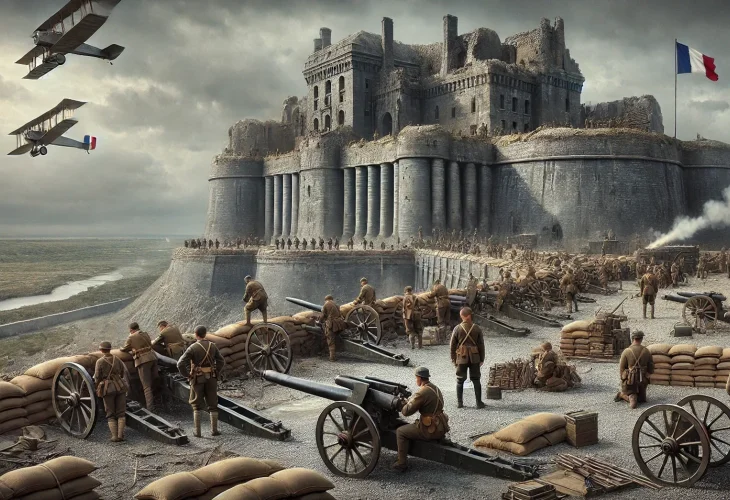The Man Who Mastered Moving Artillery: Captain Armand Lipman's Tale
*Shabbat* Peace Amid Artillery Fire: The Story of a Jewish War Hero

In 1916, during the early years of World War I, the 27th Artillery Regiment of France was stationed around Fort Verdun. This stronghold protected Verdun, a city east of Paris and close to the German border. Since 1870, the imposing Fort Verdun served as an impregnable guardian against foes from Germany or Belgium.
To the west of Verdun, the Verdun mountains, densely forested, presented a more defensible position both tactically and strategically. Though Verdun's fortress faced open plains and eastern hills, it had deep national and cultural significance for the French, who resolved to never abandon it, investing heavily in its fortifications.
By 1914, as the war began, German forces halted at Verdun, reluctant to attack the fortress. Yet, by 1915, determined as ever, Germans planned an assault. They believed the capture of Verdun, with its national value and proximity to Paris, could shatter French morale. Thus, Operation Judgement to conquer Verdun launched in early 1916.
Germans suspected the French assumed they feared capturing Verdun, and used some of Verdun's defenses elsewhere for crucial battles. The plan remained confidential, even within the German army with only the Fifth Army informed. They constructed ten rail lines and 24 new train stations across the Meuse River. The supply list was enormous: for one corps alone, it included 6,000 wire cutters, 17,000 spades, 125,000 grenades, a million sandbags, and 265,000 kg of barbed wire. They positioned 140,000 German soldiers, alongside 306 field guns, 542 heavy artillery pieces, 152 trench mortars, 17 mortars, and dozens of cannons.
On February 21, 1916, at 6 a.m., the Germans launched a surprise attack from the misty woods northeast of Verdun. Their movements were concealed under fog and camouflage nets in hidden trenches.
General Combi, commander of the 27th Artillery Regiment, faced the brunt of the attack. The French soon found themselves amidst an unprecedented artillery onslaught. Soldiers had to improvise and find ways to counter the vastly superior German forces. Among these soldiers was an extraordinarily brave and resourceful individual, Armand Lipman. He was instrumental in developing an initially makeshift strategy that eventually led to a French victory. This approach, dubbed "creeping artillery" or "fire wave," involved the French infantry advancing towards the center of French bombardment while the artillery shifted to target other German positions, magnifying the impact of the artillery beyond sheer numbers. Lipman was promoted to General Combi's aide due to his heroic efforts and astute strategies that helped maintain French national pride. He was awarded the War Cross and appointed as an officer in the Legion of Honor.
After two months, the French army rebounded, repelling the Germans from their partial conquest of Verdun's fortresses. However, Armand Lipman couldn't continue in a combat role as he suffered a heart attack amidst the battles. Although the French army intended to send him home, Lipman insisted on contributing his extensive experience and was appointed Commander of Air Defense Forces in Toulouse. Air defense was groundbreaking, as combat planes had entered military use just two years prior. Yet, Lipman made significant strides in this field, demonstrating his ingenious military insight.
Armand Lipman was the son of Rabbi Benjamin Lipman, Metz's Chief Rabbi. Even in his military service, he proudly maintained his Jewish identity, observing *Shabbat* and all Jewish laws meticulously. He is remembered in military historical literature as the Jewish officer in the Orleans garrison, spending seven days in a *sukkah* during war. After the war, Lipman dedicated himself to Jewish advocacy, settling in the Ramat Versailles Glatigny, France, and establishing a home adorned with biblical verses. A large Hebrew banner in his study read: "Rabban Shimon ben Gamliel says: The world stands on three things: justice, truth, and peace."
Lipman authored books in French elucidating Judaism's core tenets to a non-Jewish audience. He wrote a French commentary on the Torah named "The Torah of Moses," a unique book about *Shabbat*, and "The Torah of Moses is Truth," affirming Jewish faith's authenticity. He referred to himself as a "20th Century Believer" to emphasize faith's compatibility with modernity. Lipman also published historical studies. On his 70th birthday, he remarked, "All that I am—comes from Judaism." In his later years, he founded the French branch of the Orthodox organization, Agudath Israel.
Colonel Murray, a Christian officer who served with him, wrote of Lipman: "He was a genuinely holy person, cultured with a persuasive intellect and a heart of gold. He adhered to the Torah of Moses and regarded every person, irrespective of faith, as a brother, aiding them in distress. He was a man of God, enduring long pains with patience, hoping for Heaven's mercy."
An officer who served alongside him described Lipman's time in military camps: "He was content with little to help others, spending his time in prayer, Torah study, and charity."
In 1935, Armand Lipman passed away, honored by many, from the local rabbi who spoke at his funeral to his battlefield comrades who revered him.

